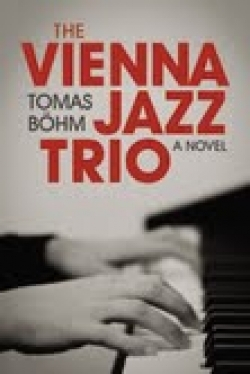The Vienna Jazz Trio
Nathan Menzel is the wrinkle on his father’s forehead, a rather timid would-be writer and pianist who grew up on Bach and Schubert. Gerhard Rosenblum is two years older, an exuberant saxophonist and med student who has been discovering “a sort of folk music for the American Negroes.” When Nathan hears a recording of “West End Blues” by Louis Armstrong, he is forever changed, and the jazz collaboration of Gerhard and Nathan is begun. The last member of this trio of Jewish be-boppers is bassist Peter Gross, a huge man whose strong percussion makes a drummer unnecessary.
But wait; these two musicians are Jews living in Vienna in the late 1920’s, where anti-Semitism, thanks to the Nazi movement there, is growing. Jazz is seen as frivolous: primitive at best, degenerate at worst. But, “It’s inside us Jews just the same as it’s inside the blacks,” Gerhard believes of the new musical form. The comparison evoked between European Jews and American Negroes in Tomas Bohm’s fifth novel is not a stretch. About 200,000 Jews lived in Vienna in 1930, and 60,000 of these were killed by the Nazis; the rest were scattered as far as Palestine and the US. Bohm, a Swede, skillfully tracks the growth of the Nazi menace—and the inability of opposing political parties to stop it–in between-the-wars Vienna. When Germany invades and occupies Austria in November 1938, he dramatizes the profound impact on the trio and their families and friends. Bohm rounds out his mix of jazz history and world history with a pinch of his own profession, psychoanalysis, by bringing into the narrative such pioneers as Sigmund and Anna Freud and Wilhelm Reich, both Viennese, and the Englishman Ernest Jones.
Bohm’s attention to analysis is not to be outdone by his reverence for the expressive power of music. As the trio develops its chops and a reputation in Vienna, then in England as war rages, and finally in the US, its members play with such legends as Coleman Hawkins, Lester Young, Thelonius Monk, and “the Mozart of our day,” as Nathan observes, saxman Charlie Parker. At the center of Bohm’s story is Nathan, who perhaps loses more to the madness in Europe than any of the others, but whose desperation, his struggle to endure and recover, his will to thrive and play the piano, and finally his desire to see a measure of justice done, is the real music of the novel.
Reviewed by
Joe Taylor
Disclosure: This article is not an endorsement, but a review. The publisher of this book provided free copies of the book and paid a small fee to have their book reviewed by a professional reviewer. Foreword Reviews and Clarion Reviews make no guarantee that the publisher will receive a positive review. Foreword Magazine, Inc. is disclosing this in accordance with the Federal Trade Commission’s 16 CFR, Part 255.

